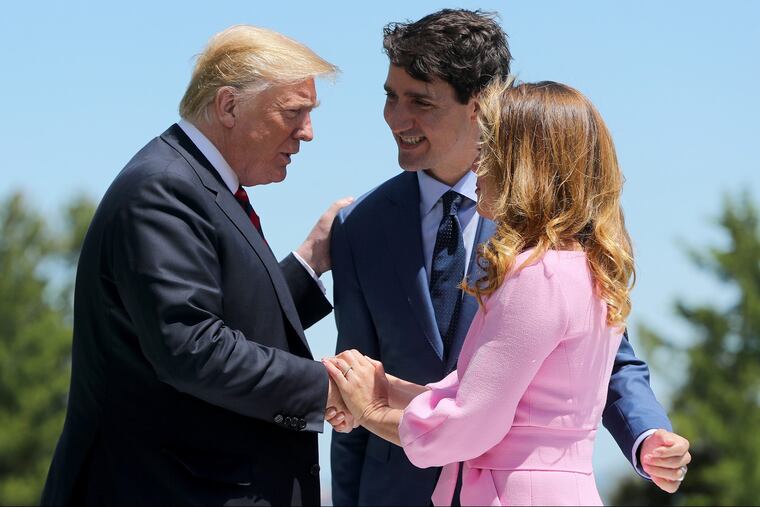Oh, Canada isn’t the one that would lose a trade war
The U.S. stands to lose more in a fight with our northern neighbor as we run a projected $12 billion to $14 billion surplus.

Well, it looks as if we are at war.
Those unscrupulous Canadians are doing us dirty and, very simply, we cannot and will not take it anymore.
Well, maybe we need to step back and ask whether the president's attack on Canada for taking advantage of the United States is warranted. Actually, the data on trade flows between the two countries indicates the U.S. is the one that is benefiting more from trade with Canada than the other way around. And that means we have potentially more to lose from a trade war than the Canadians.
The problem with the argument that Canada is engaging in unfair trade practices comes from a misunderstanding of the trade deficit. Both goods and services are traded, and if you look at just one, you get different conclusions. You need to consider how the trade in both goods and services net out.
When most people think of trade, they think goods moving from one country to another. Last year, the U.S. sent (exported) more than $282 billion of goods, such as motor vehicles, farm products, and machinery to Canada. However, the U.S. imported a lot more, about $299 billion in goods from Canada.
The difference between exports and imports is the trade deficit. So, if we just looked at the flow of goods between the two countries, it would appear that the U.S. ran a $17 billion deficit with Canada. That $17 billion could have been spent in the U.S. As a consequence, the U.S. economy grew less rapidly and job gains were not as strong as they would have been had there been no outflow of dollars to Canada.
But that is just one part of the trade puzzle. The other part is services.
Canadians love to visit the U.S. and when they do, they spend Canadian dollars here rather than in Canada. They frequent restaurants, stay in hotels, buy all sorts of things from retailers, travel on U.S-made planes owned by U.S. airlines — all the things tourists do.
But services are not limited to tourism. Canadians come to the U.S. for health care, spending Canadian dollars here rather than in Canada. Canadian businesses and individuals use U.S. financial companies for transactions. These types of expenditures, as well as many others, are services.
And services are where the argument that the Canadians are unfair trading partners breaks down.
Last year, Canadians spent $58.5 billion on U.S. services while we bought only $33 billion Canadian services. That is, we ran a nearly $25.5 billion trade surplus with Canada when it came to services. That is money that could have been spent in Canada but was spent here instead.
To determine the actual trade deficit, you have to net out the exports and imports of both goods and services. We may have run a $17 billion deficit when it came to goods, but we ran a $25.5 billion surplus when it came to services.
The net result is that the U.S. ran a roughly $8.5 billion surplus with Canada last year. That is, our economy benefited more from trade, as measured simply by the flow of dollars between the two economies, than the Canadian economy.
We ran even larger surpluses in 2016 ($12.7 billion) and 2015 ($10 billion). This year, we could run a surplus in the $12 billion to $14 billion range.
What matters when it comes to trade is the flow of money. The U.S. is running a profit or surplus with Canada, not a loss or deficit.
And that raises real concerns. If Canada reciprocates, it doesn't have to put tariffs on goods. It can make it more difficult or expensive to travel to the U.S. or purchase U.S. services. That would be a lot easier than not buying the U.S. goods they crave and would allow Canada to close its trade deficit with the U.S. by attacking the part of trade where the U.S. benefits the most.
And if they limit the purchase of services, U.S. hotels, airlines, financial institutions, retailers, hospitals, medical product suppliers, and a whole range of other businesses would be harmed.
The administration seems to think it is insulting that Canadians would consider the imposition of tariffs on their steel and aluminum as unfair. But we are the ones running the trade surplus, not the Canadians.
So which country is taking advantage of the other? If you use trade deficits or surpluses as the standard, which the president seems to be doing, it isn't Canada.